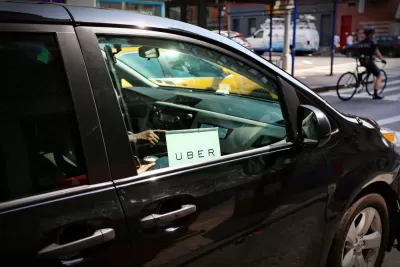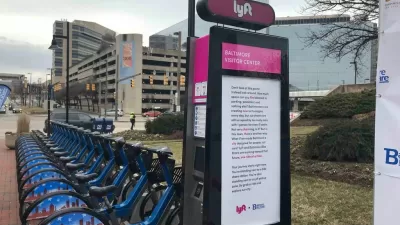A judge ruled against California's Proposition 22, which let ride-hailing and delivery businesses classify workers as independent contractors and discouraged unionization efforts.

Margot Roosevelt and Suhauna Hussain report on a decision that reopens the debate on the gig economy in California and could have lasting repercussions as ride-hailing companies seek to fight regulation in other states. Last Friday, "a state Superior Court judge invalidated a 2020 ballot proposition that allowed Uber, Lyft, DoorDash, Instacart and other app-based businesses to classify their workers as independent contractors."
Historically, "California courts are often hesitant to overturn ballot measures because the move can be seen as challenging the will of the people." But "[i]n a lawsuit brought by the Service Employees International Union and several drivers, Alameda County Superior Court Judge Frank Roesch ruled that Proposition 22 is unconstitutional and unenforceable" because it "infringes on the power of the Legislature explicitly granted by the state Constitution to regulate compensation for workers’ injuries." According to Judge Roesch, "[b]y including language aimed at preventing drivers from unionizing, the ballot measure also violates a constitutional provision that requires laws and initiatives to be limited to a single subject." Because "a ballot initiative cannot be amended after it is passed by voters, any unconstitutional provision renders it unenforceable."
"Uber and other gig economy companies spent more than $220 million last year in the nation’s costliest-ever ballot initiative campaign to exempt their drivers from a 2019 law, AB 5, requiring gig workers across many industries to be classified as employees with benefits such as minimum wage, overtime and workers’ compensation in case of injury." Uber plans to appeal the decision.
FULL STORY: Prop. 22 is ruled unconstitutional, a blow to California gig economy law

Trump Administration Could Effectively End Housing Voucher Program
Federal officials are eyeing major cuts to the Section 8 program that helps millions of low-income households pay rent.

Planetizen Federal Action Tracker
A weekly monitor of how Trump’s orders and actions are impacting planners and planning in America.

Ken Jennings Launches Transit Web Series
The Jeopardy champ wants you to ride public transit.

Washington Legislature Passes Rent Increase Cap
A bill that caps rent increases at 7 percent plus inflation is headed to the governor’s desk.

From Planning to Action: How LA County Is Rethinking Climate Resilience
Chief Sustainability Officer Rita Kampalath outlines the County’s shift from planning to implementation in its climate resilience efforts, emphasizing cross-departmental coordination, updated recovery strategies, and the need for flexible funding.

New Mexico Aging Department Commits to Helping Seniors Age ‘In Place’ and ‘Autonomously’ in New Draft Plan
As New Mexico’s population of seniors continues to grow, the state’s aging department is proposing expanded initiatives to help seniors maintain their autonomy while also supporting family caregivers.
Urban Design for Planners 1: Software Tools
This six-course series explores essential urban design concepts using open source software and equips planners with the tools they need to participate fully in the urban design process.
Planning for Universal Design
Learn the tools for implementing Universal Design in planning regulations.
Heyer Gruel & Associates PA
Ada County Highway District
Institute for Housing and Urban Development Studies (IHS)
City of Grandview
Harvard GSD Executive Education
Toledo-Lucas County Plan Commissions
Salt Lake City
NYU Wagner Graduate School of Public Service





























